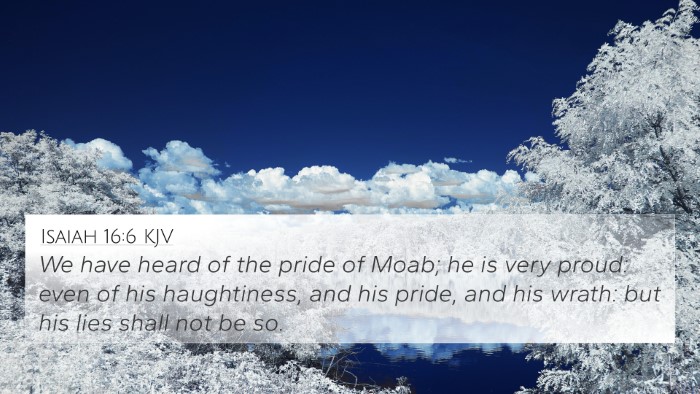Understanding Jeremiah 48:30
Jeremiah 48:30 reads: “I know his wrath, saith the Lord; but it shall not be so, his lies shall not prevail.”
This verse forms part of a larger oracle against Moab, emphasizing God’s righteous judgment over the nation.
The primary message of this verse concerns God's omniscience regarding the pride and arrogance of Moab,
and it asserts that despite their false security and reliance on lies, they will ultimately face God's justice.
Below, we explore the detailed meaning of Jeremiah 48:30 through insights from Matthew Henry, Albert Barnes,
and Adam Clarke.
Insights from Commentaries
Matthew Henry's Commentary
Matthew Henry highlights the theme of divine foreknowledge in this verse. He points out that God is aware of
the extent of Moab's pride and the futility of their efforts to resist His will. Henry suggests that Moab's lies
indicate a false sense of security that will lead to their downfall. He emphasizes that the truth of God's
words will ultimately prevail over human deceit.
Albert Barnes' Notes
Albert Barnes focuses on God’s assertion regarding His knowledge of Moab's wrath. He explains that the
phrase “I know his wrath,” signifies God's comprehensive understanding of Moab’s actions and intents.
Barnes also notes that the Lord's declaration outlines His sovereign authority over nations, affirming
that no amount of human deception can alter God's purposes.
Adam Clarke's Commentary
Adam Clarke interprets this verse through the lens of God’s judgment. Clarke notes that the wrath mentioned
signifies God's impending judgment against the Moabites for their vanity and idolatry. He emphasizes
that despite Moab’s confidence in their deceitful alliances, they will not escape the effects of divine
judgment. Clarke also underlines that God's declarations serve as warnings against reliance on human
wisdom over divine revelation.
Key Themes in Jeremiah 48:30
- Divine Knowledge: God's omniscience about human intentions and actions.
- Judgment on Pride: The consequences of arrogance and deceitful practices.
- Truth vs. Falsehood: God's ultimate truth will prevail against human lies.
- Divine Sovereignty: God’s authority over nations and their fates.
Bible Verse Cross-References
The connections between Jeremiah 48:30 and other Scripture help deepen understanding of its themes. Below are
several related Bible verses that offer insight into similar concepts:
- Proverbs 16:5: "Everyone who is arrogant in heart is an abomination to the Lord."
This supports the theme of pride leading to destruction.
- Isaiah 28:15: "Because you have said, ‘We have made a covenant with death...’"
This reflects reliance on false securities.
- Psalms 18:27: "For you save a humble people, but the haughty eyes you bring down."
Here, humility is contrasted with pride.
- Isaiah 2:11: "The haughty looks of man shall be brought low, and the lofty pride of men shall be humbled."
This highlights God’s power to humble the proud.
- Jeremiah 49:16: "The terror you inspire and the pride of your heart have deceived you."
This illustrates the themes of pride leading to deception.
- Obadiah 1:3: "The pride of your heart has deceived you."
This verse reinforces the concept of pride affecting perception and reality.
- Galatians 6:7: "Do not be deceived: God is not mocked, for whatever one sows, that will he also reap."
This emphasizes divine justice similar to the context in Jeremiah.
Thematic Bible Verse Connections
The inter-Biblical dialogue concerning pride and judgment can be further explored across both Testaments.
One can trace the nuances of pride from the Prophets to the teachings in the New Testament, revealing
a unified biblical message about humility, divine judgment, and the assurance of God's truth over falsehood.
Tools for Bible cross-referencing, such as a Bible concordance, can enhance one's ability
to identify these connections.
Conclusion
Jeremiah 48:30 serves as a poignant reminder of God's awareness of human pride and the ultimate triumph of
His truth. By examining this verse in the light of various biblical commentaries and cross-referencing associated verses,
readers can gain profound insights into the nature of God's judgment and the futility of deception.
Utilizing cross-reference Bible study methods is essential for a comprehensive understanding of scriptural themes.








